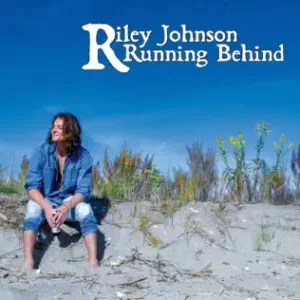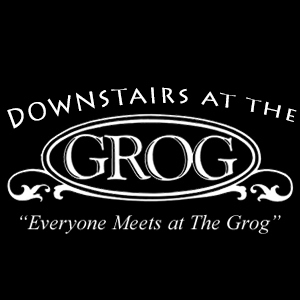 Connecticut singer-songwriter Riley Johnson keeps his new Running Behind album carefully balanced between singer-songwriter material and Americana roots influences. While his narratives stem from his songwriter eye, his vocal timbre, approach, and all of his instrumentation ring out with authentic notes and chords from rustic acoustic instruments and old time American flavor. This results in a double whammy of witty observation and tasteful nuggets from the heart of the homeland.
Connecticut singer-songwriter Riley Johnson keeps his new Running Behind album carefully balanced between singer-songwriter material and Americana roots influences. While his narratives stem from his songwriter eye, his vocal timbre, approach, and all of his instrumentation ring out with authentic notes and chords from rustic acoustic instruments and old time American flavor. This results in a double whammy of witty observation and tasteful nuggets from the heart of the homeland.
Opening track “A Handful Of Rain” weaves plummy acoustic notes from acoustic guitars, puts them behind Johnson’s earnest, youthful voice and, voila, a dandy, a song that sounds pure of heart, roots flavored, with a message just as innocent. Wholesome vocal sustains match the prettiness of a pedal steel traipsing over the backdrop. Descriptions of love’s longs make for warm amusement. Johnson’s voice keeps one glued with it understated innocence. Only 22, Johnson displays an advanced ability to put a lot of good things together.
“Pocketful Full Of Holes” finds Johnson putting his sturdy vocal and all its sustains over a catchy, alluring acoustic strum. While the voice and main melody instrument work their simple magic, pulpy percussion and an engaging chord progression from several other instruments and a winding pedal steel line make a fine home for Johnson’s earnest vocal pluck. This is a young man who understands human emotions and the circumstances that wove them and he creates a soundscape that captures the emotive grist that keeps all of those moving parts in motion.
Title track “Running Behind” grabs the listener’s attention with a sweeping harmonica line and a rippling electric guitar melody. The sweet melodic accompaniment allows Johnson freedom of vocal movement. His voice rides this dappling sunlight of sound with an easy swagger. This singer-songwriter is in complete control of this breezy breath of fresh air. One can feel the youthful vigor in Johnson’s voice and in the depth of band support as he carries it all along.
The quiet, spare “Standing By The Shore” shows another side of Johnson’s songwriting. No less reflective, he delivers a lot of feeling, becomes more impacting as he moves through this down tempo open spacer. His youthful voice carries his message well without a large swirl of acoustic and electric instruments. His lyrical descriptions of kids walking along a beach travel beautifully alongside a run of bright electric guitar notes.
Returning to his usual pace, Johnson sings “When I Get Old” like he wants us to enjoy it as we’re cruising down Route 95 on a summer’s day. His voice runs smoothly, including several plaintive sustains, over a chirpy background that contrasts well with the waves of vocal phrasing. It’s also uncanny how he weaves singer-songwriter sentiment and sensitivity into songs that sound like they were born in the era of classic rock radio.
“Willow Street Station” combines Johnson’s steady acoustic strum with a trickling electric guitar line. Over which he sings out with a vigor and a passion that only the young can muster when there is something they must say.
On “The Flying Postcard,” a shuffling groove gives the piece a traveling sensation, something that reminds of long train rides. Placed atop that is a motivational, uptempo acoustic strum and a pretty as a bird singing pedal steel. The accompaniment makes the ride and the scenery pass by quickly through the passenger’s window. Johnson ‘s voice, plaintive and sincere, finds a good home amid the homey guitar.
“All Night Drinking Lady” tumbles along with a rambling harmonica line and carefully paced acoustic guitar. Johnson’s lyrics and his voice caressing them sew a sorrowful tale of this song’s title character, the mood of the song being its greatest strength. It mopes at an easy pace, with plenty of bright emotive guitar notes contrasting sweetly with the more weepy notes and words. This lets Johnson pack plenty of feeling into this, making it into something that makes the listener feel it.
“The Ballad Of Ryder West” mixes honky tonk piano, pedal steel, and a soft shuffle to build a platform for Johnson’ chirpy drawl. The flavorful tones alone could carry this song. Pile on Johnson’s sincere vocal run, complete with homey sustains, and the listener gets a double heaping dose of something genuine, home on the range songcraft that moves like a fun, rollicking bus ride.
“That Train Don’t Run This Way No More” offers even more of Johnson’s particular country-ish sound . Johnson’s uptempo, slappy acoustic work keeps this number in constant edgy motion. Throw in some brisk electric guitar grist, a wad of gurgling organ, and a speedy groove, and we have a hopping, jumping, frisky piece of action. Johnson’s earnest sounding timbre and his hearty assertions give this number an added sense of reckless fun.
The forlorn emotions of “Catfish” develop well, Johnson’s voice a plaintive call to sympathy for an aging hippie living on a fishing boat. Johnson’s rangy voice nails the emotive sustains as well as the quieter, softer moments in this song. Likewise, his acoustic six strings moves easily from his assertive lines to his sadly down tempo weepy chords. Johnson creates a vivid scene lyrically while successfully wringing all the emotion possible from the accompaniment.
“Looking In The Sky” leads the listener with the gentle hand via a pretty, whistling pedal steel line. Once one is coaxed into this piece, Johnson’s voice handles its share of the work. His clear, assertive vocal glides with a muscular wingspan over a firm acoustic guitar chord progression, a sharp, lovely electric guitar, as well as the pedal steel. Boy, does that Johnson kid have a vocal presence over that tuft of sweet accompaniment, a lot of power sailing over the prettiness.
Close out track “Where The Ships Come In” feels like a farewell for now song. Its quiet presence and hopeful lyrics indicate there is a chance for new love. The feeling of transition translates beautifully on the strength of Johnson’s earnest and sincere timbre. This translates the emotions with how he finesses each word with tremendous feeling by using tasteful self-restraint and letting his lyrics breathe.
Johnson has got himself one outstanding debut album in Running Behind. For a 22 year old to have developed such an artistic eye for life’s details and the talent to render human feelings bare and open for us is nothing short of remarkable. That he can marry his natural abilities to the idioms and nuances to Americana music while keeping his sound open to all listeners is another major feat. We can only sit back and wonder how far this wonder will go. Produced, mixed, and mastered by the Rich Demko at Greenwood Studios in Seymour, Connecticut, Running Behind feels and sounds authentic in every note.

